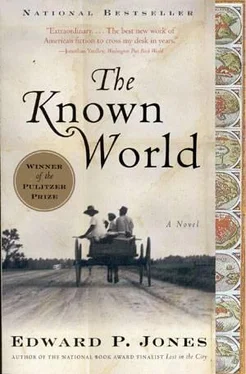Clara Martin had but one slave to her name, fifty-five-year-old Ralph, a thin man with hair down to his shoulders who suffered with rheumatism throughout the winter. All through those months, hobbled, he moved through a world of thick molasses, suppressing a moan with each step. But come March, his bones, as he put it, got happy again. Ralph had been in her husband’s family since his birth and had come along when she, at twenty, married “my dear sweet Mr. Martin.” Her husband had been dead fifteen years, and their only child, a son, had gone to find an eternally elusive happiness in untamed California, “on the other side of the world,” as Clara once put it in a letter to her Arlington relative. So for years Clara had lived alone, peacefully, with Ralph, who did the cooking, among other tasks, for her. Her nearest neighbor was a long walk away into another county. And then the slaves became restless in other Virginia counties, followed by that awful letter about a once faithful slave up in Arlington who didn’t want to do the usual recipes anymore.
That spring of 1844 on a Friday, Skiffington and Winifred went out to spend time with Clara. They left Minerva-then twelve and coming into her own-at home; Winifred, and even Skiffington, might think of her as a kind of daughter but everyone knew who was included in a supper invitation and who was not. There was but one prisoner in the jail, and Skiffington’s father had agreed to feed and watch over him. The prisoner, an amiable Frenchman named Jean Broussard, had murdered his Scandinavian partner, the first murder of a white person in the county in twenty-six years. Broussard liked to talk. He liked to sing even more. Skiffington had grown tired of Broussard calling him “Monsieur Sheriff.” Indicted only three days before Skiffington left for Clara’s, Broussard had been waiting for Virginia authorities to find a judge to come out his way for a trial. Broussard said he was innocent, and he said American justice would ultimately proclaim it so.
By mid-morning of that Friday, Skiffington and Winifred had reached the plantation of Robert and Alfreda Colfax, a white family with ninety-seven slaves to their names, and it was there that they took a twelve-thirty dinner. Robert had a collection of antique European pistols that he loved to show anyone he felt was capable of enjoying them without letting envy intrude. His problem was that most men envied, so he could not show the pistols the way he wanted. Robbins, a good friend to Colfax, did not envy and they often enjoyed them together, sometimes well into the night. Skiffington also did not envy. Colfax’s sons thought the pistols no more than toys. So he loved when Skiffington visited because they could, together, with such care, take down the pistols one by one from the cabinet Augustus Townsend had made and admire what some German or Italian had crafted a long time ago as if his life had depended upon it.
The Friday Skiffington and Winifred arrived about three o’clock, Clara Martin was standing in the yard, and Ralph came from around the back and took their horse and carriage. “Good mornin, Mr. Skiffington. Good mornin to you, Miss Skiffington,” he said. His long hair was tied back with a rope.
Skiffington and Winifred said good afternoon. Ralph turned and looked at them, then nodded. “Yes. Yes, good noon,” he said. Clara watched him lead the horse and carriage away and when he was gone, she gave Skiffington a knowing look. “What am I gonna do with him, John?” she said.
He smiled. “He’s fine, Clara. A little slow, but he’s fine.” Skiffington had had his patrollers look in on her from time to time but that had not been enough. “John, she skittish as a colt,” Barnum Kinsey told Skiffington after one visit. “And to tell you the truth, John, I ain’t seen nothin for her to be skittish about. I looked but I couldn’t find it.”
They ate a little after five, with Ralph preparing the meal and then retiring to his room that had been built onto the kitchen not long after Clara had married. Clara picked at the food. Winifred and Skiffington ate heartily, hoping that their good appetites would show her that there was nothing to fear. She said nothing but Winifred could see that Clara had lost weight since the last time she saw her. Winifred had had an aunt who had wasted away to skin and bones but that had been from consumption and the woman had lived in Connecticut.
“I’d like you to talk to him,” Clara said to Skiffington after supper. They were in the parlor. Ralph had appeared to take away the dishes and then disappeared again before bringing in coffee some fifteen minutes later. The rope was gone from his hair. Once, some five years before, he had come into the parlor and found Clara struggling to comb and brush her hair. “Oh, my goodness,” she kept saying. “Better I should have no hair at all than all this mess.” “Now don’t you say that, Miss Martin.” “Well, it’s just a mess, Ralph. It most certainly is.” It had been raining all day and it was summer so his bones gave him nothing to complain about. “My sister,” she said, “got the hair God shoulda given me. And she has never appreciated it, I must say. Wondrous red hair. A queen’s hair. Not one day has she thanked God for that hair and yet he lets her keep it right on.” “Yo sister got nothin on you, thas for sure, Miss Martin. Let me now, if that be fine with you,” he said, standing behind her, touching the back of her hand. He had never touched her before in any deliberate way, only in some innocent, accidental way no witness would ever think anything about. Hesitantly, she raised her hand higher and after a few seconds she opened it and he took the brush. There had been thunder and lightning earlier in the day but now there was only rain, falling on the porch, tapping the window, watering the plants in the garden that had gone so long without. “Let me, if that be fine with you,” and he gently worked through her hair. When the brush had done its work, he reached around without asking permission and took the comb, which had been resting in the very center of her lap. There were a few strands of hair in the comb and he took them out and they took their own time falling to the floor. She leaned back in the chair and closed her eyes, thinking, Yo sister got nothin on you . He spent an hour on it, brushing and combing and applying a little sweet oil, and before he was done, she had fallen asleep, which was unusual for her because she always said the bed was the only place where her body could sleep. She awoke hours later to find Ralph gone and her hair in plaits, soft to her fingers, callused and bony. She called his name, once and once again, and when she saw the candle, dancing with a feeble light, and became aware of a silence that seemed to have a kind of voice, she thought there was something wrong in calling him like that and so closed her mouth. She sighed and leaned back in the chair. She soon fell asleep again and stayed much of the night in the chair. The rain went on for another two days and he did her hair each of those days but never again after that. “That should do, Ralph,” she said that final time. “That will do for now.” “Yessum.”
As they drank their coffee, Clara said again to Skiffington, “I’d like you to talk to him.”
“Now what would I say to him, Clara?” Skiffington said.
“I don’t know. Somethin sheriff like. Somethin a sheriff would say to a miscreant. A possible miscreant. ‘I have my eyes on you, you possible miscreant.’ ”
Winifred laughed. She had been drinking coffee at that moment and now set the cup on the tiny table beside her. The laughter came from what Clara had said but also because the word miscreant reminded her of school days and spelling tests in Philadelphia. Her husband had been sheriff for about a year. He called her “Mrs. Skiffington,” and she called him “Mr. Skiffington,” except when he had displeased her or made her unhappy, and then he was “John” for days and days.
Читать дальше












